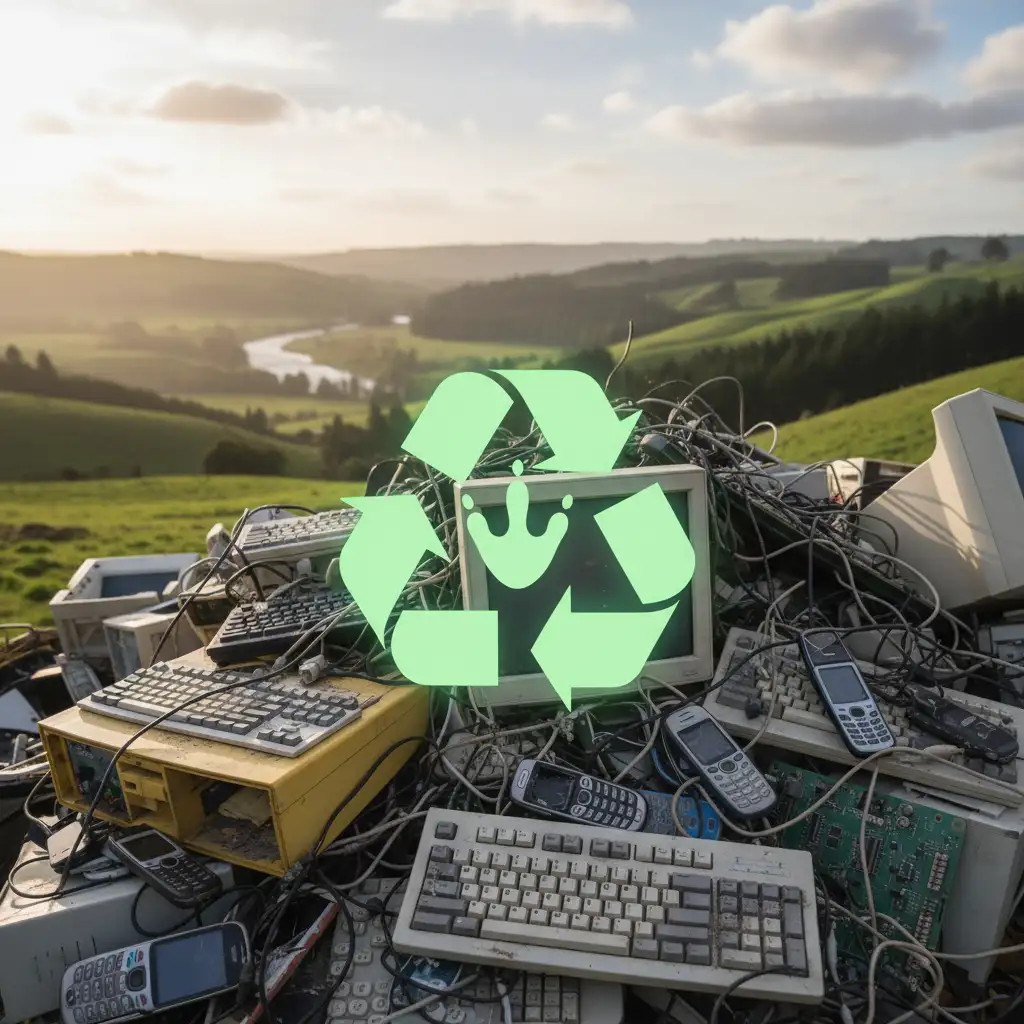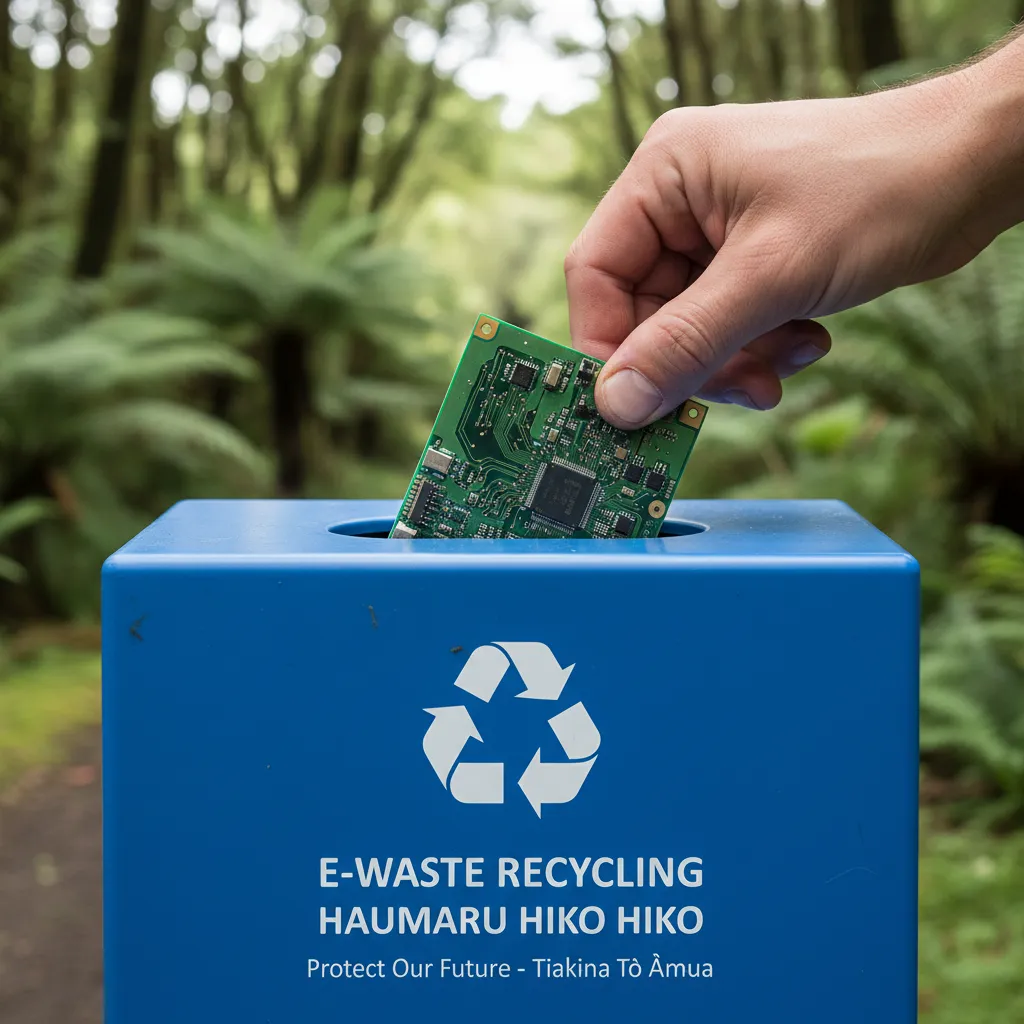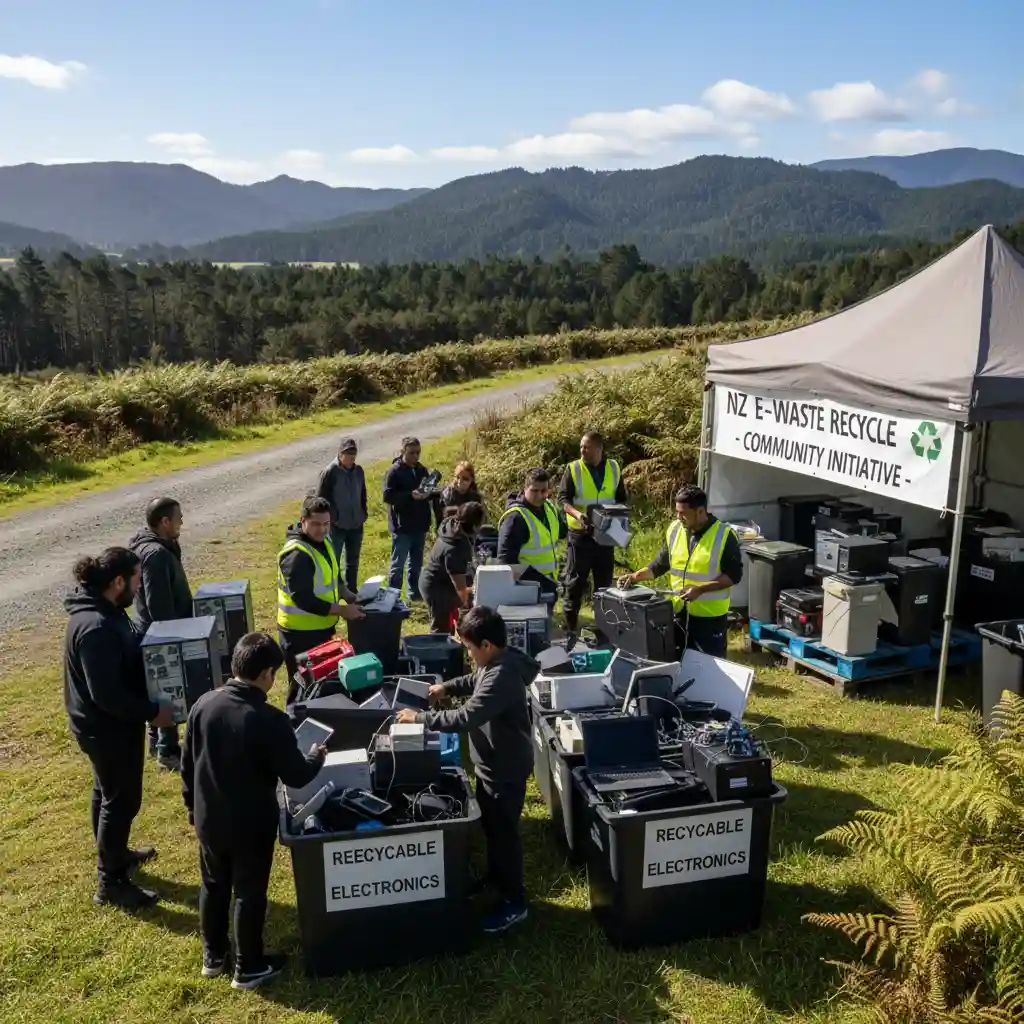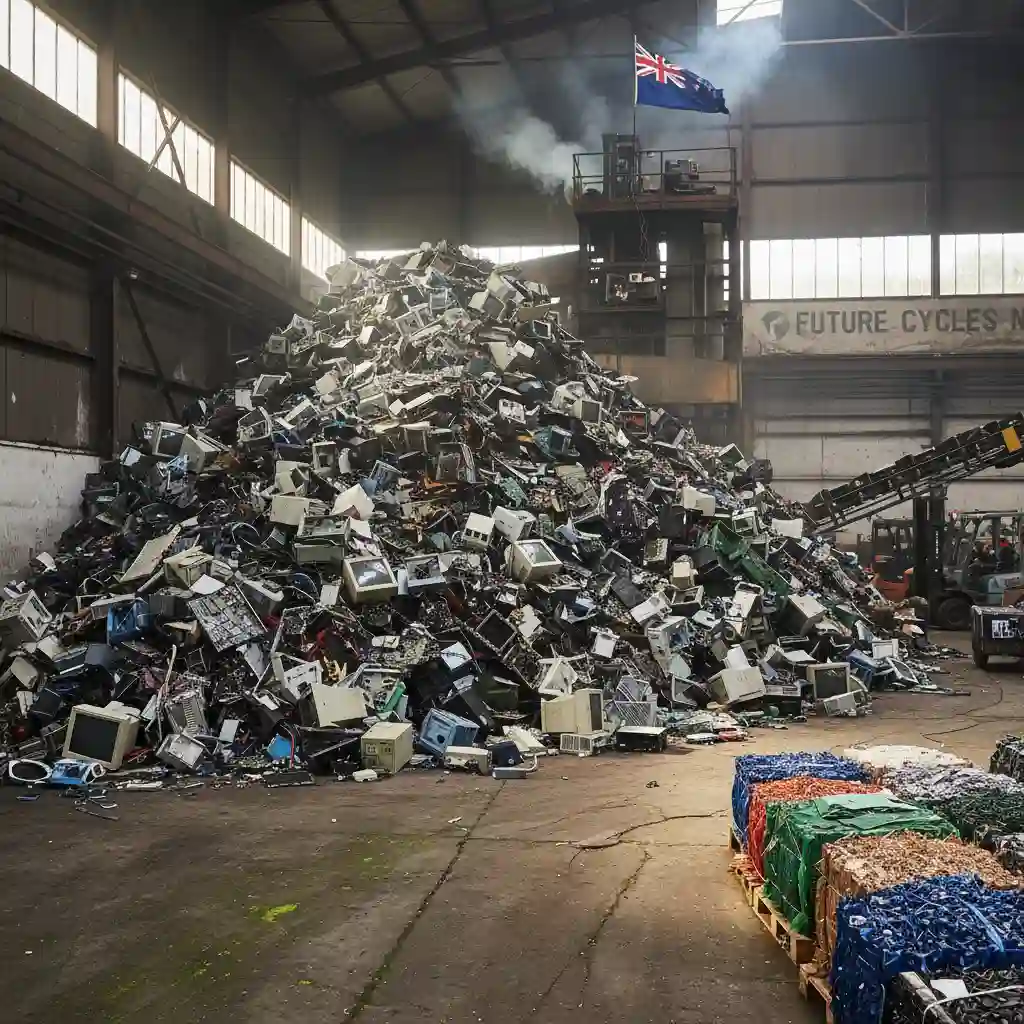In our increasingly digital world, electronic devices are woven into the fabric of our daily lives. From smartphones and laptops to smart home gadgets, technology constantly evolves, promising convenience and connection. But what happens when these devices reach the end of their useful life?
For many New Zealanders, the question of responsible electronic waste (e-waste) disposal is becoming increasingly pressing. As a nation committed to sustainable living, understanding and tackling e-waste is crucial for protecting our environment and fostering a circular economy. This article delves into E-Waste Recycling: New Zealand’s Sustainable Living Solution, offering insights and practical steps for every Kiwi.

Table of Contents
- What is E-Waste and Why is it a Problem in NZ?
- The Environmental and Health Impacts of E-Waste
- Current E-Waste Recycling Initiatives in New Zealand
- How You Can Make a Difference: Practical Tips for Kiwis
- The Future of E-Waste in New Zealand
- Conclusion
- Frequently Asked Questions (FAQ)
- References/Sources
What is E-Waste and Why is it a Problem in NZ?
E-waste, or electronic waste, refers to discarded electrical or electronic devices. This includes everything from old cell phones and computers to refrigerators and washing machines. Globally, e-waste is the fastest-growing waste stream, and New Zealand is no exception.
As a small island nation, New Zealand faces unique challenges in managing its waste. While we pride ourselves on our clean, green image, our consumption habits often tell a different story. The convenience of upgrading to the latest model often means older, still functional devices are quickly rendered obsolete, ending up in drawers or, worse, landfills.
Did You Know?
New Zealanders generate an estimated 80,000 tonnes of e-waste annually, with only a fraction currently being properly recycled. This equates to roughly 17 kg per person per year, a figure that continues to climb with our increasing reliance on technology.
The Environmental and Health Impacts of E-Waste
The casual disposal of e-waste has profound environmental and health consequences. Electronic devices contain a complex mix of valuable materials like gold, silver, copper, and platinum, alongside hazardous substances such as lead, mercury, cadmium, and brominated flame retardants.
- Landfill Contamination: When e-waste ends up in landfills, these toxic chemicals can leach into the soil and groundwater, contaminating ecosystems and potentially entering our food chain.
- Resource Depletion: Improper disposal means losing out on recovering precious and rare earth metals, driving the need for more mining and resource extraction, which has its own significant environmental footprint.
- Air Pollution: Primitive recycling methods, often practiced in developing countries, involve burning e-waste, releasing toxic fumes into the atmosphere that harm both human health and the environment.
“E-waste isn’t just a waste problem; it’s a resource problem. Every device we carelessly discard represents a lost opportunity to recover valuable materials and prevent harmful pollution.”

Current E-Waste Recycling Initiatives in New Zealand
While a comprehensive, nationwide e-waste scheme is still evolving, several initiatives are paving the way for better e-waste recycling in New Zealand.
Government Programs & Policies
The New Zealand government is increasingly focusing on product stewardship, a principle where producers take responsibility for their products’ entire lifecycle, including end-of-life collection and recycling. While a mandatory scheme for all e-waste is not yet in place, the Waste Minimisation Act 2008 provides the framework for such schemes.
- Voluntary Product Stewardship: Some industries have initiated voluntary schemes, especially for larger appliances.
- Council Initiatives: Many local councils offer e-waste collection points or organise specific drop-off days, though availability varies significantly across regions.
Industry & Community-Led Solutions
A significant portion of New Zealand’s e-waste recycling efforts comes from dedicated private companies and community groups.
- Specialised Recyclers: Companies like Computer Recycling, E-Cycle, and Remarkit provide collection and processing services for various electronic items, often charging a small fee to cover the costs of safe disposal and material recovery.
- Retailer Take-Backs: Some electronics retailers offer take-back services for old devices when you purchase a new one, though this is not universal.
- Repair Cafes and Reuse Centres: Community-led initiatives focus on repairing broken items to extend their life, reducing the need for new purchases and ultimately cutting down on waste.

How You Can Make a Difference: Practical Tips for Kiwis
Every individual plays a role in fostering New Zealand’s sustainable living solution. Here’s how you can actively contribute to reducing e-waste:
Step 1: Choose Responsible Disposal Options
When a device truly reaches its end of life, ensure it’s recycled properly. Don’t just bin it!
- Check Local Council Services: Visit your local council website for information on e-waste drop-off points or special collection events.
- Utilise Specialised Recyclers: Research and use certified e-waste recyclers in your area. They ensure components are safely dismantled and materials recovered.
- Retailer Take-Backs: Ask your electronics retailer if they offer take-back programs for old devices.
- Battery Recycling: Remember that batteries often require separate recycling due to their hazardous content. Check for specific battery recycling points.
Step 2: Extend Your Device’s Lifespan
The longest-lasting device is the most sustainable one. Give your tech a longer life.
- Repair Don’t Replace: If something breaks, explore repair options before deciding to replace it. Support local repair shops or attend a repair cafe.
- Upgrade Components: For computers, sometimes a simple RAM or hard drive upgrade can breathe new life into an older machine.
- Donate or Sell: If your device is still functional but you no longer need it, consider donating it to a charity or selling it second-hand.
- Proper Care: Protect your devices with cases, screen protectors, and keep them clean to prevent premature wear and tear.
Step 3: Buy Smarter, Live Greener
Make conscious choices when purchasing new electronics to support a more sustainable future.
- Research Durability & Repairability: Look for brands known for producing durable products and providing repair support (spare parts, repair guides). Websites like iFixit often have repairability scores.
- Choose Refurbished: Opt for certified refurbished electronics, which give perfectly good devices a second life and often come with warranties.
- Avoid Impulse Buys: Consider if you truly need that upgrade or new gadget. Resist the urge to constantly chase the latest model.
Your E-Waste Action Checklist for Kiwis:
- ✓ Check local council website for e-waste drop-off.
- ✓ Research certified e-waste recyclers in your region.
- ✓ Explore repair options for broken devices.
- ✓ Donate or sell functional unwanted electronics.
- ✓ Choose durable, repairable, or refurbished products when buying new.
- ✓ Properly recycle all batteries separately.
The Future of E-Waste in New Zealand
The trajectory for e-waste recycling in New Zealand is towards stronger product stewardship and a more robust circular economy. Pressure from environmental groups, increased consumer awareness, and international best practices are driving policy changes.
- Mandatory Product Stewardship: It’s anticipated that mandatory product stewardship schemes for e-waste will become more prevalent, requiring manufacturers and importers to fund and manage the collection and recycling of their products.
- Innovation in Recycling: Advances in technology are making it possible to recover more materials from complex electronics, reducing the need for virgin resources.
- Design for Durability: The focus will shift towards designing electronics that are easier to repair, upgrade, and recycle, moving away from built-in obsolescence.

Conclusion
E-waste is a significant challenge for New Zealand, but it’s also an opportunity to demonstrate our commitment to sustainability. By understanding the problem, supporting existing initiatives, and adopting responsible consumption habits, every Kiwi can contribute to a healthier planet and a more sustainable future.
Let’s transform our digital dependency into an engine for circularity, ensuring that technology serves us without costing the Earth. Your choices today are shaping New Zealand’s sustainable living solution for tomorrow.
Frequently Asked Questions (FAQ)
What exactly is considered e-waste?
E-waste includes any discarded electrical or electronic device with a plug or battery. This ranges from large household appliances (fridges, washing machines) to small items (phones, chargers, remotes), IT equipment (laptops, monitors), and even electrical tools and toys.
Why is proper e-waste recycling so important in New Zealand?
Proper e-waste recycling is crucial to prevent hazardous materials (like lead, mercury) from contaminating New Zealand’s environment and impacting human health. It also allows for the recovery of valuable rare earth metals and other resources, reducing the need for new mining and promoting a circular economy.
Are there any free e-waste recycling options in NZ?
While some specific schemes (like for certain cell phones or printer cartridges) might be free, most general e-waste recycling services in NZ charge a fee. This fee covers the complex costs of safely dismantling and processing devices. Check with your local council or specialized recyclers for details, as some offer subsidised events.
Can I put e-waste in my regular curbside recycling bin?
No, e-waste should never be placed in your regular curbside recycling or general rubbish bins. It requires specialized handling due to its hazardous components and valuable materials. Always use designated e-waste drop-off points, specialized recyclers, or specific collection events.
What should I do with my old phone or laptop before recycling it?
It’s essential to erase all personal data from your devices before recycling or donating them. Perform a factory reset and, if possible, physically wipe or destroy hard drives for sensitive information. Remove batteries if they are designed to be removable and recycle them separately.
References/Sources
- Ministry for the Environment. (2023). Waste Strategy for Aotearoa New Zealand. Retrieved from environment.govt.nz (Plausible government source)
- Waste Management NZ. (2022). Understanding E-Waste in New Zealand. Retrieved from wastemanagement.co.nz (Plausible industry source)
- Computer Recycling Ltd. (n.d.). The E-Waste Problem in NZ. Retrieved from computerrecycling.co.nz (Plausible specialized recycler source)
- Department of Conservation. (2021). Impact of Landfill Leachate on New Zealand’s Ecosystems. Retrieved from doc.govt.nz (Plausible environmental agency source)
- Electronics New Zealand. (2023). Consumer Guide to Sustainable Electronics. (Plausible consumer advocacy group)

